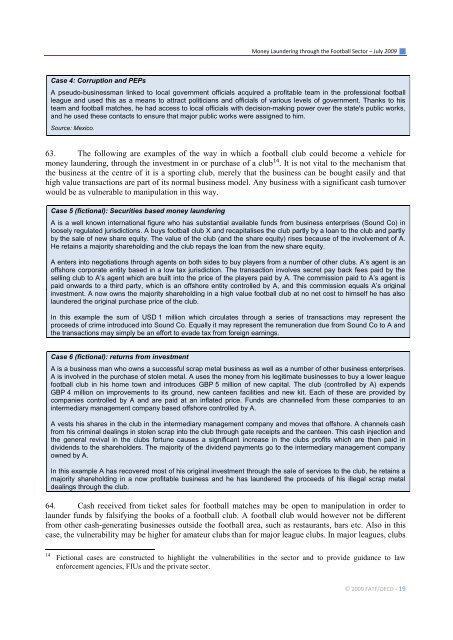Money Laundering through the Football Sector
Money Laundering through the Football Sector
Money Laundering through the Football Sector
You also want an ePaper? Increase the reach of your titles
YUMPU automatically turns print PDFs into web optimized ePapers that Google loves.
Case 4: Corruption and PEPs<br />
<strong>Money</strong> <strong>Laundering</strong> <strong>through</strong> <strong>the</strong> <strong>Football</strong> <strong>Sector</strong> – July 2009 <br />
A pseudo-businessman linked to local government officials acquired a profitable team in <strong>the</strong> professional football<br />
league and used this as a means to attract politicians and officials of various levels of government. Thanks to his<br />
team and football matches, he had access to local officials with decision-making power over <strong>the</strong> state's public works,<br />
and he used <strong>the</strong>se contacts to ensure that major public works were assigned to him.<br />
Source: Mexico.<br />
63. The following are examples of <strong>the</strong> way in which a football club could become a vehicle for<br />
money laundering, <strong>through</strong> <strong>the</strong> investment in or purchase of a club 14 . It is not vital to <strong>the</strong> mechanism that<br />
<strong>the</strong> business at <strong>the</strong> centre of it is a sporting club, merely that <strong>the</strong> business can be bought easily and that<br />
high value transactions are part of its normal business model. Any business with a significant cash turnover<br />
would be as vulnerable to manipulation in this way.<br />
Case 5 (fictional): Securities based money laundering<br />
A is a well known international figure who has substantial available funds from business enterprises (Sound Co) in<br />
loosely regulated jurisdictions. A buys football club X and recapitalises <strong>the</strong> club partly by a loan to <strong>the</strong> club and partly<br />
by <strong>the</strong> sale of new share equity. The value of <strong>the</strong> club (and <strong>the</strong> share equity) rises because of <strong>the</strong> involvement of A.<br />
He retains a majority shareholding and <strong>the</strong> club repays <strong>the</strong> loan from <strong>the</strong> new share equity.<br />
A enters into negotiations <strong>through</strong> agents on both sides to buy players from a number of o<strong>the</strong>r clubs. A‟s agent is an<br />
offshore corporate entity based in a low tax jurisdiction. The transaction involves secret pay back fees paid by <strong>the</strong><br />
selling club to A‟s agent which are built into <strong>the</strong> price of <strong>the</strong> players paid by A. The commission paid to A‟s agent is<br />
paid onwards to a third party, which is an offshore entity controlled by A, and this commission equals A‟s original<br />
investment. A now owns <strong>the</strong> majority shareholding in a high value football club at no net cost to himself he has also<br />
laundered <strong>the</strong> original purchase price of <strong>the</strong> club.<br />
In this example <strong>the</strong> sum of USD 1 million which circulates <strong>through</strong> a series of transactions may represent <strong>the</strong><br />
proceeds of crime introduced into Sound Co. Equally it may represent <strong>the</strong> remuneration due from Sound Co to A and<br />
<strong>the</strong> transactions may simply be an effort to evade tax from foreign earnings.<br />
Case 6 (fictional): returns from investment<br />
A is a business man who owns a successful scrap metal business as well as a number of o<strong>the</strong>r business enterprises.<br />
A is involved in <strong>the</strong> purchase of stolen metal. A uses <strong>the</strong> money from his legitimate businesses to buy a lower league<br />
football club in his home town and introduces GBP 5 million of new capital. The club (controlled by A) expends<br />
GBP 4 million on improvements to its ground, new canteen facilities and new kit. Each of <strong>the</strong>se are provided by<br />
companies controlled by A and are paid at an inflated price. Funds are channelled from <strong>the</strong>se companies to an<br />
intermediary management company based offshore controlled by A.<br />
A vests his shares in <strong>the</strong> club in <strong>the</strong> intermediary management company and moves that offshore. A channels cash<br />
from his criminal dealings in stolen scrap into <strong>the</strong> club <strong>through</strong> gate receipts and <strong>the</strong> canteen. This cash injection and<br />
<strong>the</strong> general revival in <strong>the</strong> clubs fortune causes a significant increase in <strong>the</strong> clubs profits which are <strong>the</strong>n paid in<br />
dividends to <strong>the</strong> shareholders. The majority of <strong>the</strong> dividend payments go to <strong>the</strong> intermediary management company<br />
owned by A.<br />
In this example A has recovered most of his original investment <strong>through</strong> <strong>the</strong> sale of services to <strong>the</strong> club, he retains a<br />
majority shareholding in a now profitable business and he has laundered <strong>the</strong> proceeds of his illegal scrap metal<br />
dealings <strong>through</strong> <strong>the</strong> club.<br />
64. Cash received from ticket sales for football matches may be open to manipulation in order to<br />
launder funds by falsifying <strong>the</strong> books of a football club. A football club would however not be different<br />
from o<strong>the</strong>r cash-generating businesses outside <strong>the</strong> football area, such as restaurants, bars etc. Also in this<br />
case, <strong>the</strong> vulnerability may be higher for amateur clubs than for major league clubs. In major leagues, clubs<br />
14 Fictional cases are constructed to highlight <strong>the</strong> vulnerabilities in <strong>the</strong> sector and to provide guidance to law<br />
enforcement agencies, FIUs and <strong>the</strong> private sector.<br />
© 2009 FATF/OECD - 19


